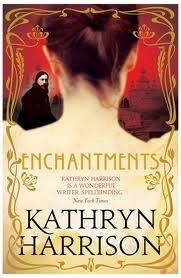 I love learning new things. Usually they come in the form of lessons:
I love learning new things. Usually they come in the form of lessons:
“Slamming your hand in the oven hurts.”
“Trees don’t move, avoid running into them.”
“Leave the gun…take the canoli.”
but in that rare opportunity that I get to expand my brain under the assumption of pure entertainment I get giddy.
When I was in High School, Disney released a movie called “Anastasia.” I loved this movie (Don’t judge me!) and as a result became unabashedly obsessed with the Romanov dynasty. I watched movies about them, I scoured every National Geographic I could find, and pretty much made the local library my bitch. I just couldn’t get enough. But…with all of my note taking, and obsessive compulsive Wikipedia-ing I never really paid attention to Rasputin. Oh, he was there, lurking in the background like a disease, but my attention was required elsewhere so off it went. Until now. (Damn you…you kooky bastard.)
My initial reason for grabbing this book was 1 sentence:
“After Rasputin’s body is pulled from the icy waters of the Neva River, his eighteen-year-old daughter, Masha, is sent to live at the imperial palace with Tsar Nikolay and his family—including the headstrong Prince Alyosha.”
Hellooooo Romanovs!!
But instead of getting Masha with a little Alyosha foreplay, I got a Russian history lesson. A very intriguing Russian history lesson cleverly disguised as fiction.
“St. Petersburg, 1917. After Rasputin’s body is pulled from the icy waters of the Neva River, his eighteen-year-old daughter, Masha, is sent to live at the imperial palace with Tsar Nikolay and his family—including the headstrong Prince Alyosha. Desperately hoping that Masha has inherited Rasputin’s miraculous healing powers, Tsarina Alexandra asks her to tend to Aloysha, who suffers from hemophilia, a blood disease that keeps the boy confined to his sickbed, lest a simple scrape or bump prove fatal.
Two months after Masha arrives at the palace, the tsar is forced to abdicate, and Bolsheviks place the royal family under house arrest. As Russia descends into civil war, Masha and Alyosha grieve the loss of their former lives, finding solace in each other’s company. To escape the confinement of the palace, they tell stories—some embellished and some entirely imagined—about Nikolay and Alexandra’s courtship, Rasputin’s many exploits, and the wild and wonderful country on the brink of an irrevocable transformation. In the worlds of their imagination, the weak become strong, legend becomes fact, and a future that will never come to pass feels close at hand.”
This is the first time I can say, (with unwavering confidence) that I spent equal parts reading and investigating a book. While normally (even with historical fiction) I will take an author at his/her word, (when it comes to details) and just keep on trucking, there was something so formal about the plot (or “stories”) told by Masha, (to Alyosha) that I had this historians twitch to know if they were actually true. Time and time again I found myself challenging the author, and time and time again… I was proven wrong.
“There is NO WAY some prince got pissed, dressed in drag, tricked Rasputin into coming over and then fed him cakes soaked in cyanide!”
True!
“Oh hell no…someone does not get cut, almost in half, and live to tell about it!!!”
True…again. (feel free to look both of those up.)
Because of this, (the ridiculous accuracy of some of the most outlandish things) I found myself unable to put “Enchantments” down. I had to know the truth! (Even if it involved someone being eaten by a bear.) It wasn’t necessarily about HOW the story ended, (because…well, we already know how that well that turned out,) but it was more about the personal glimpses into what happened BEFORE the end, (How the Tsar behaved under house arrest. How OTMA sewed jewels into their frillies just in case they were forced to move in the middle of the night.) that had me so enthralled.
Now yes…there were a FEW parts that were fiction. ( Alyosha didn’t REALLY race Hermes on a bright red bike) but what can one really expect from a girl who is trying desperately to distract a dying boy? (Who knew Hemophilia was a death sentence! *shrugs*)
So what can be said other than “I was head deep in Russia and LOVED it?” Why don’t we talk about Harrison’s writing? It was genuinely unique. Harrison is not a newbie in the book world, but until “Enchantments” I had never read anything by her, so her brazen stanzas, and no nonsense approach to dialogue was intriguing. That’s not to say that it wasn’t a difficult book to read. Like I’ve said…(roughly 70 times now) this book read a lot like a history lesson, so there are pages and pages of historical accounts and flashbacks that, if you’re not careful (in regards to pacing yourself,) might (very likely) turn you off. In other words…this isn’t a book for the (streamline) plot hungry.
And at the end of the day it was sad. Not because everyone died (I hope this isn’t a spoiler…God it shouldn’t be) but because of the mental awareness everyone had KNOWING that they were going to die. (Imagine living with that hanging over your shoulder….Alyosha certainly did.)
Overall…good book. Detailed (almost to the point of annoyingness,) but good all the same.
This is one for bio junkies and history buffs. No one else need apply.
Happy Reading my fellow kindle-ites and remember: I am now an expert on all things “Mad Monk” I would be an asset to anyone’s Trivial Pursuit team.
Click image for complete details
[Rating:3.5/5]





It sounds so intriguing! (I also loved Anastasia, btw) The cover on Amazon in not anywhere as pretty as this one! I’ll have to keep an eye out for this one!
Yes, I agree… I actually nabbed the one off of Goodreads (I don’t think it’s the American version) and used it 🙂 It truly was an interesting read (if you are a Romanov junkie) so if you do decided to read it (for the record..it comes out March 6th) be sure to stop back by and tell me what you thought of it!